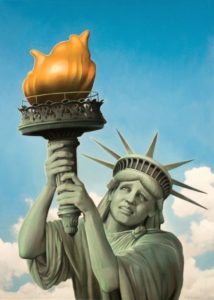Overcast this late-afternoon Thursday here in California’s Central Valley — maybe a warm preview of our fog days coming in a couple of months.
Although not uncomfortable, still carries a depressing, sad ambiance, which does seem to fit into the scope of things nowadays.
Scrolling through my normal afternoon news cycle earlier with the UK’s Liz Truss chaos (can you believe, Boris might come back?) well positioned on the front headline burner, I spied stories on the political deep divide across America between MAGA/Right and decent folks. A major point is rural vs urban and the open country’s wretched outlook on life.
Educated (Democrat) vs uneducated (Republican) — first, a good view of affluence vs poor at New York Magazine from yesterday:
A more educated Democratic coalition is, naturally, a more affluent one. In every presidential election from 1948 to 2012, white voters in the top 5 percent of America’s income distribution were more Republican than those in the bottom 95 percent. Now, the opposite is true: Among America’s white majority, the rich voted to the left of the middle class and the poor in 2016 and 2020, while the poor voted to the right of the middle class and the rich.
Meanwhile, in the American outback a festered outlook:
What's depressing about this is that in reality rural America is heavily subsidized by urban America 1/https://t.co/SNKAKJu7KX
— Paul Krugman (@paulkrugman) October 20, 2022
There’s a swelling underbelly out in the rural areas and despite the low population, the shit has hit the fan and could upset the apple cart for the majority of people. Kal Munis, an assistant professor of political science at Utah Valley University, and Nicholas Jacobs, an assistant professor of government at Colby College, take a hard, educated look at rural voters vs urban in an analysis this morning at The Washington Post — some snips:
As the midterms approach, political observers are once again talking about the widening divide between urban and rural voters. Over the past 25 years, rural areas have increasingly voted Republican while cities have increasingly voted Democratic — a dividing line that has replaced the North/South divide as the nation’s biggest source of political friction. That divide will influence which party takes control of Congress in January.
But why are rural and urban voters so sharply divided? Some scholars and pundits argue that it comes down to who lives where: that the disproportionately White, older, more religious, less affluent and less highly educated voters who live in rural areas are more likely to hold socially conservative views generally championed by Republicans. Meanwhile, urban areas are filled with younger, more racially diverse, more highly educated and more affluent people who hold the more socially liberal views generally championed by Democrats.
While all that matters, our new research shows that place itself also matters. Unlike Republican voters in suburbs and the cities, rural voters care about what we might call “geographic inequity” — the idea that rural areas receive less than their fair share from the government, are ignored by politicians, and are mocked and derided in popular culture. Without these beliefs, the urban-rural political divide would not be as vast as it is today.
…
In other words, rural resentment was among the most powerful factors in pushing respondents to vote for Republicans.
…
Meanwhile, experts agree that the urban-rural divide is harming the health of U.S. democracy. For example, when Republicans win the presidency, they often do so without a popular majority. Many states create districts that group rural voters with one another and urban voters with one another, making races less competitive or even shoo-ins for one party or the other. Safe districts often mean less accountability and more extreme candidates. Alternatively, Republicans in states such as Utah have split the urban vote, combining neighborhoods in places like Salt Lake City with vast, sparsely populated rural areas adjacent to the city, to ensure Democrats can’t win any districts.
Although the piece concludes the problem of rural resentment needs ‘…addressing it is key to a more democratically healthy future,’ it offers no recommendations. Mainly because there aren’t any, especially if those resentments reformed from lies and bullshit — as the authors note: ‘But voters form judgments based on what they believe to be true. And most rural voters resent what they perceive to be real geographic inequity. Perceptions, not facts, drive political behavior‘
The only real way to address that shitty resentment from MAGA hatters is to vote Democrat, and tsunami-like.
Ha, ha, people who resent empathy and kindness:
In the country or not, once again here we are…
 (Image out front by illustrator and portrait painter, Tim O’Brien, and can be found here)
(Image out front by illustrator and portrait painter, Tim O’Brien, and can be found here)